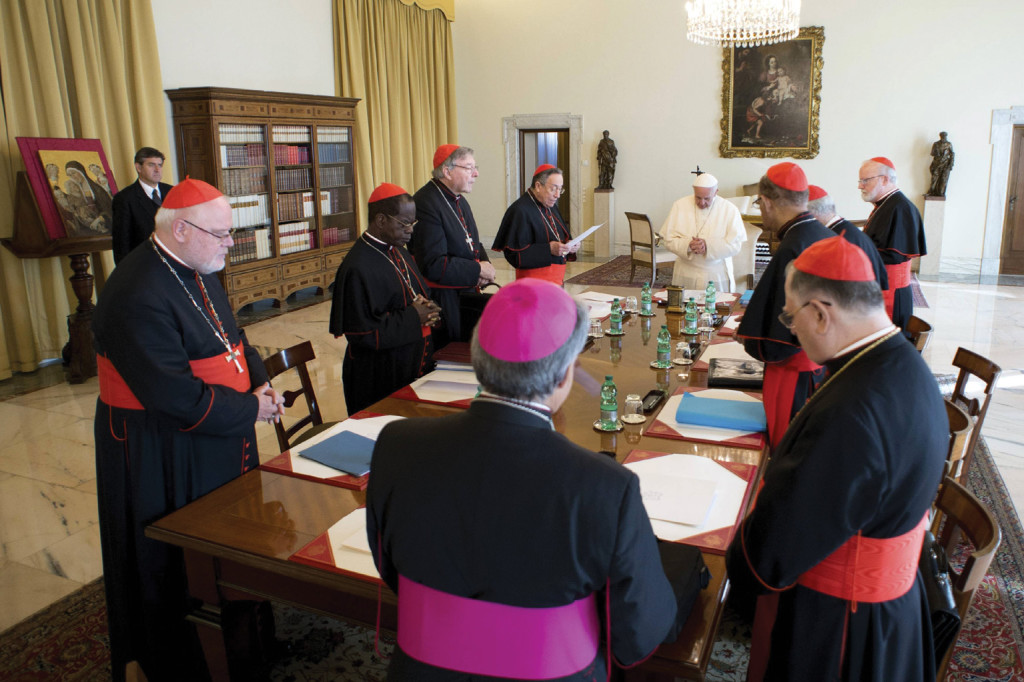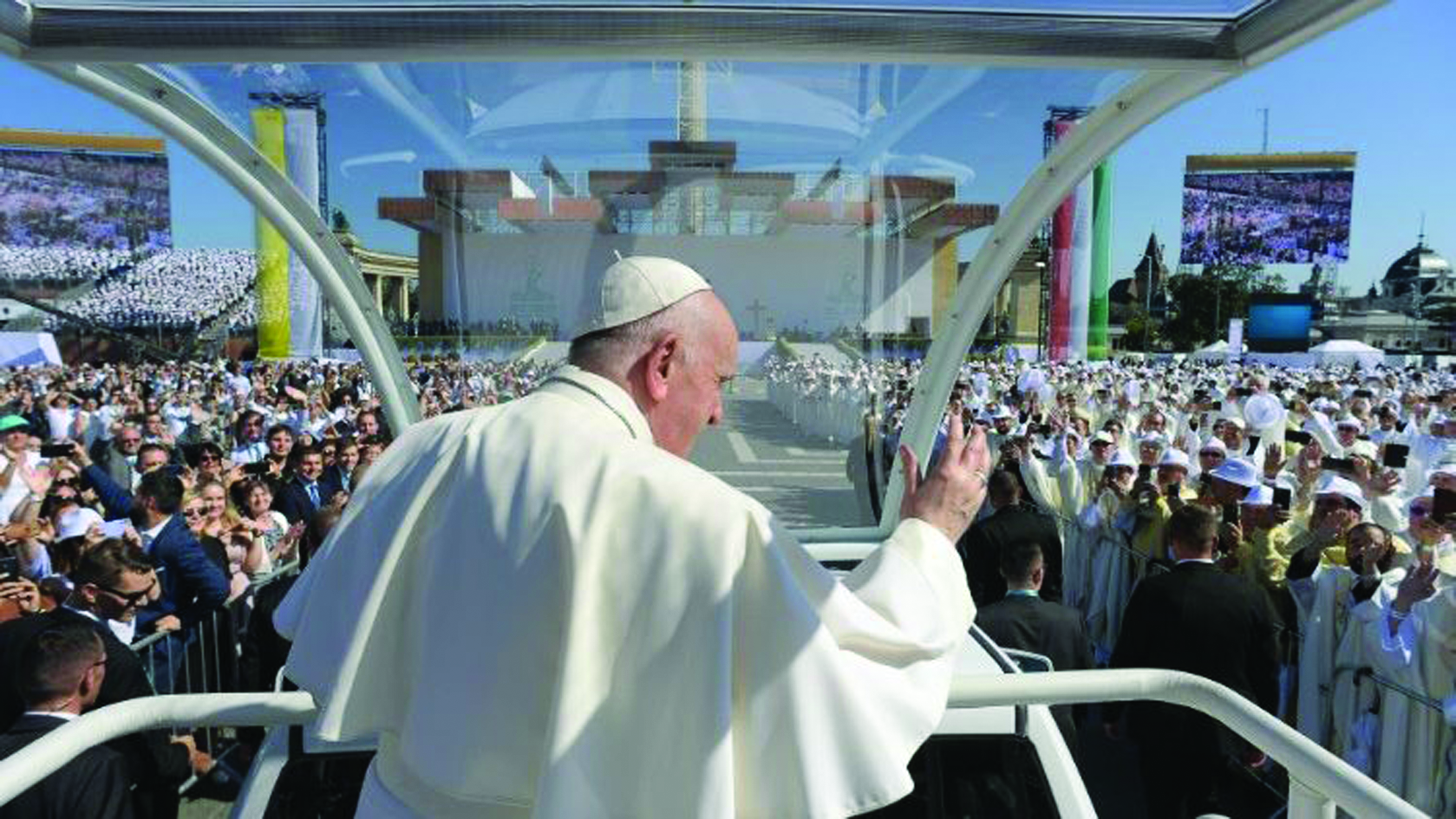“Combine the dicasteries, for example, to streamline the organization a bit.”
This is what Pope Francis said he wanted to do in the Roman curia, responding to journalists on the return flight from his late May pilgrimage to the Holy Land.
The fact that the merger of dicasteries was one of the changes studied by the council of eight cardinals — the “C8,” selected by the pontiff to assist him in the reform of the curia and in the governance of the universal Church — was not a secret.
But for the first time, Francis himself has expressly indicated this objective. The Pope added that the C8 will discuss it not only at the scheduled four-day meeting at the beginning of July, but also at a subsequent meeting on the calendar for September.
Jorge Mario Bergoglio made no reference to what the projected mergers may entail.
But if we connect the dots, it is already possible to figure out which dicasteries are most at risk.
Let’s start with a first consideration.
The immediate predecessors of Pope Francis, once they were elected, over the span of a few weeks had confirmed in their positions the heads of all the curial dicasteries who had lost their mandates during the sede vacante.
Francis did not follow this practice. So much so that almost 15 months after his election there are still a good number of dicasteries that have not had the confirmation of their leadership or their member cardinals and bishops.
As of now, the pontiff has confirmed the leaders of the Secretariat of State, the Prefecture of the Pontifical Household, the Office for Liturgical Ceremonies, and of eight of the nine existing Congregations: Doctrine of the Faith, Oriental Churches, Causes of Saints, Bishops, Evangelization of Peoples, Clergy, Religious, Catholic Education. But not the leaders of the Congregation for Divine Worship.
Pope Francis has also confirmed the leaders of five pontifical councils (Laity, Christian Unity, Justice and Peace, Interreligious Dialogue, Culture) but not those of the other six: Family, Cor Unum, Migrants, Legislative Texts — where, however, a new undersecretary has been appointed — Social Communications, and New Evangelization.
Nor has there been any confirmation of the leaders of the Apostolic Signatura — although an adjunct secretary has been sent — nor of those of the Administration of the Patrimony of the Apostolic See, APSA, or of the Prefecture for Economic Affairs.
Among the pontifical commissions, only the one for Latin America, connected to the Congregation for Bishops, has been confirmed, but not yet the three connected to Doctrine of the Faith (Ecclesia Dei, Pontifical Biblical Commission, and International Theological Commission), nor that of Sacred Archeology, connected to the Council for Culture.
Having said that, it is interesting to note what happened on May 22, when the new cardinals created in February by Pope Francis were assigned their memberships in the curial dicasteries.
These appointments had an appendix on May 28 with the inclusion of the new Cardinal Pietro Parolin, the secretary of state, in the Congregation for the Doctrine of the Faith.
On the whole, what has happened is that the new cardinals have been distributed only and exclusively in the dicasteries already confirmed by Pope Francis, including the Pontifical Commission for Latin America, but not in the others still on hold. No newly-created cardinal, therefore, has been made a member of the Congregation for Divine Worship, which until Paul VI was part of the Congregation for the Causes of Saints, under the name of the Congregation for Rites.
Similarly, no newly-created cardinal has been assigned to the Pontifical Councils for the Family, Migrants, Legislative Texts, Social Communications, New Evangelization or Cor Unum. Nor has there been any assignment to the Apostolic Signatura or to APSA.
A simple coincidence? Or are these precisely the curial dicasteries on the verge of being “streamlined” and “consolidated?”
Still, it must be taken into account that almost all of the dicastery heads confirmed by Pope Francis are the same as before his election as Pope, in spite of the universally negative judgments that have fallen upon the curia they lead and the general requests for a change of personnel before structural changes.
For the convenience of the reader, the following is the list of cardinals and bishops currently at the top of the organisms of the Roman Curia properly speaking. In bold are the Churchmen confirmed in their positions and in red those appointed “ex novo” by the current pontiff. (The underlined names are officials named under Pope Benedict XVI and not yet reconfirmed.) To this list must obviously be added the Secretariat for the Economy created by Pope Francis, who placed at its head, as prefect, the Australian Cardinal George Pell, 73.
SECRETARIAT OF STATE
Secretary of State
Cardinal Pietro Parolin,
59, Italian diplomat
Substitute for General Affairs
Archbishop Angelo Becciù,
66, Italian diplomat
Secretary for Relations with States
Archbishop Dominique Mamberti,
62, French diplomat (Corsica)
CONGREGATIONS
Congregation for the Doctrine of the Faith
Prefect • Cardinal Gerhard L. Müller,
67, German
Secretary • Archbishop Luis Ladaria,
70, Spanish Jesuit
Adjunct secretary • Archbishop Augustine Di Noia, 71, United States Dominican
Congregation for Eastern Churches
Prefect • Cardinal Leonardo Sandri,
71, Argentine diplomat
Secretary • Archbishop Cyril Vasil,
49, Slovak Jesuit
Congregation for Divine Worship
Prefect • Cardinal Antonio Cañizares Llovera,
69, Spanish
Secretary • Archbishop Arthur Roche,
64, English
Congregation for the Causes of Saints
Prefect • Cardinal Angelo Amato,
76, Italian Salesian
Secretary • Archbishop Marcello Bartolucci,
70, Italian
Congregation for Bishops
Prefect • Cardinal Marc Ouellet,
70, Canadian Sulpician
Secretary • Archbishop Ilson de Jesus Montanari, 55, Brazilian
Congreg. for the Evangelization of Peoples
Prefect • Cardinal Fernando Filoni,
68, Italian diplomat
Secretary • Archbishop Savio Hon Tai-fai,
64, Chinese Salesian
Adjunct Secretary • Archbishop Protase Rugambwa, 54, Tanzanian
Congregation for the clergy
Prefect • Cardinal Beniamino Stella,
73, Italian diplomat
Secretary • Archbishop Celso Morga Iruzubieta, 66, Spanish, of Opus Dei
Secretary for Seminaries • Archbishop Jorge Carlos Patron Wong, 56, Mexican
Congregation for Religious
Prefect • Cardinal Joao Braz de Aviz,
67, Brazilian
Secretary • Archbishop José Rodríguez Carballo, 61, Spanish Franciscan
Congregation for Catholic education
Prefect • Cardinal Zenon Grocholewski,
75, Polish
Secretary • Archbishop Angelo Zani,
64, Italian
TRIBUNALS
Penitentiary • Cardinal Mauro Piacenza,
70, Italian
Prefect of the Apostolic Signatura
• Cardinal Raymond Leo Burke,
66, United States
Secretary • Archbishop Frans Daneels,
73, Belgian Norbertine
Secretary • Bishop Giuseppe Sciacca,
59, adjunct
PONTIFICAL COUNCILS
Pontifical Council for the Laity
President • Cardinal Stanislaw Rylko,
69, Polish
Secretary • Bishop Josef Clemens,
67, German
Pontifical Council
for the Promotion of Christian Unity
President • Cardinal Kurt Koch,
64, Swiss
Secretary • Bishop Brian Farrell, 70, Irish,
of the Legionaries of Christ
Pontifical Council for the Family
President • Archbishop Vincenzo Paglia, 69, Italian
Secretary • Bishop Jean Laffitte, 62, French
Pontifical Council for Justice and Peace
President • Cardinal Peter Turkson 66, Ghanaian
Secretary • Bishop Mario Toso,
64, Italian Salesian
Pontifical Council “Cor Unum”
President • Cardinal Robert Sarah,
69, Guinean
Pontifical Council for the Pastoral Care of Migrants and Itinerants
President • Cardinal Antonio M. Vegliò,
76, Italian diplomat
Secretary • Bishop Joseph Kalathiparambil, 62, Indian
Pontifical Council for the Pastoral Care of Health Care Workers
President • Archbishop Zygmunt Zimowski ,
65, Polish
Pontifical Council for Legislative Texts
President • Cardinal Francesco Coccopalmerio,
76, Italian
Secretary • Bishop Juan Ignacio Arrieta,
63, Spanish, of Opus Dei
Pontifical Council for Interreligious Dialogue
President • Cardinal Jean-Louis Tauran,
71, French diplomat
Pontifical Council for Culture
President • Cardinal Gianfranco Ravasi,
72, Italian
Delegate • Bishop Carlos Alberto de Pinho Moreira Azevedo, 61, Portuguese
Secretary • Bishop Barthelemy Adoukonou,
72, Beninois
Pontifical Council for Social Communications
President • Archbishop Claudio Maria Celli,
73, Italian diplomat
Pontifical Council for the Promotion of
the New Evangelization
President • Archbishop Rino Fisichella,
63, Italian
Secretary • Archbishop Octavio Ruiz Arenas,
70, Colombia
OFFICES
Administration of the Patrimony of
the Apostolic See
President • Cardinal Domenico Calcagno,
71, Italian
Prefecture for Economic Affairs of
the Holy See
President • Cardinal Giuseppe Versaldi,
71, Italian
OTHER ORGANISMS
Pontifical Household
Prefect • Archbishop Georg Gänswein, 58, German







Facebook Comments